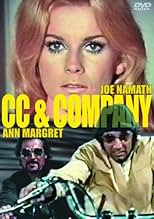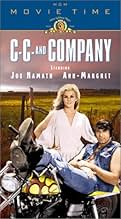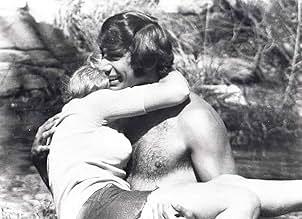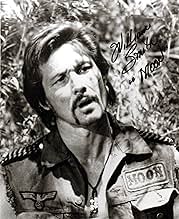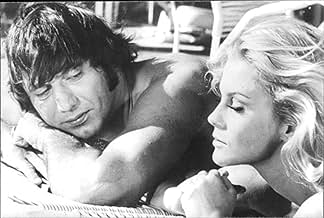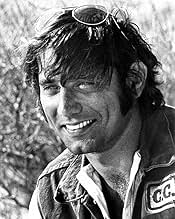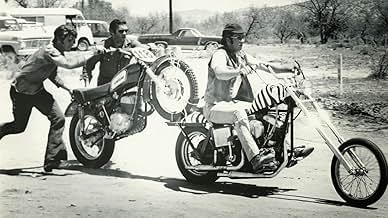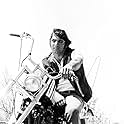AVALIAÇÃO DA IMDb
4,8/10
1,1 mil
SUA AVALIAÇÃO
Adicionar um enredo no seu idiomaA motorcycle rebel saves a woman from his gang and fights an outlaw guru for supremacy.A motorcycle rebel saves a woman from his gang and fights an outlaw guru for supremacy.A motorcycle rebel saves a woman from his gang and fights an outlaw guru for supremacy.
- Direção
- Roteirista
- Artistas
Jacquie Rohr
- Zit-Zit
- (as Jackie Rohr)
Bill Baldwin
- Night Watchman
- (as William Baldwin)
Avaliações em destaque
While Joe Namath was likeable in his role, William Smith, who made a living mostly playing "bad guys" in many B pictures, gave the best performance in this movie. Smith looked like a biker, unlike Namath. He was nasty, grizzled, and mean. Just what you would expect from a "Hells Angel." With an R rating it would have been nice to see a little more skin (especially on a young Ann Margret) but the movie is worth seeing anyway.
Although Ann-Margret is gorgeous as always, Joe Namath cannot carry a suitcase, let alone a movie. I loved him as a quarterback, ...BUT, except for his horrendous performance in NORWOOD with Glen Campbell, he just doesn't have it. Thank God, William Smith (fine actor) has plenty of scenes with Joe and Ann-Margret.
A 4 out of 10. Best performance = Mr. Smith. Exchanging furtive glances, Mr. Namath and Ann simply look foolish, although there are great location shots..I believe in the Southwest. Pure exploitation but just not enough fun, skin, plot, or talent. Ann has a great hairstyle though in 1970!
A 4 out of 10. Best performance = Mr. Smith. Exchanging furtive glances, Mr. Namath and Ann simply look foolish, although there are great location shots..I believe in the Southwest. Pure exploitation but just not enough fun, skin, plot, or talent. Ann has a great hairstyle though in 1970!
I'm not an American, but I'm well aware of Joe Namath being a sporting legend. However, as an actor he stinks. He's very wooden and lacks charisma, and whoever decided to cast him as a biker was an idiot. Namath plays C.C. Ryder, a nice guy mechanic who runs with a biker gang "The Heads", led by Moon (biker movie legend William Smith). While he is accepted by most of the gang, he has an easy relationship with Moon, and once he becomes involved with a "straight" fashion reporter (Ann-Margaret) tensions mount, leading to a kidnapping. Namath as I said is lousy, and as 90% of the movie focuses on him, it makes it hard to stay interested. But Ann-Margaret is a babe, and even better William Smith is terrific. Smith plays a great bad ass, it's just a pity there wasn't more of him in the movie. As well as Smith watch 'C.C. and Company' to see Sid Haig and Bruce Glover as two of Smith's biker pals. These three talented character actors save the movie from being a complete turkey.
As producers, Allen Carr and Roger Smith didn't know how to make movies but they did know how to market them. "C.C. and Company" (1970) was one of Smith's attempts to revive the acting and singing career of his wife Ann-Margret, whose American career had pretty much dried up in the mid-60's. So they looked around for a way to package the aging star in a vehicle they could profitably distribute.
They decided to capitalize of the huge popularity of the super bowl champion N.Y. Jets quarterback Broadway Joe Namath. If you were not around in 1969 you will have a hard time grasping the extent of Joe's popularity. At its peak he was probably the most popular sports figure of all time and he single-handedly transformed NFL viewing from a men's club to a mixed gender group. In "C.C. and Company" Joe doesn't act so much as just play his relaxed good- natured self in front of the camera. The film begins with its best sequence as Joe, playing an outlaw motorcycle club member named C. C. Ryder, is shown walking around inside a supermarket while casually assembling a sandwich from the various products on the shelves. After he eats the sandwich he helps himself to a Twinkie and a small carton of milk. Then he hits the checkout line with just a package of "Fruit Stripe" gum to pay for and exits the store. This might be film's only attempt at symbolism as the gas tank and rear fender of Joe's chopper are painted a zebra stripe pattern. Baby boomers may recall that "Fruit Stripe" gum commercials featured a zebra.
Carr and Smith (Smith also wrote the screenplay) chose to make an independent outlaw motorcycle picture, a sub-genre dominated by American International. While AI's films were normally distributed to drive-ins, Carr and Smith hoped to exploit the recent unexpected success of "Easy Rider"- a motorcycle movie that had played well in mainstream theaters. And this is just what they did with "C.C. and Company", using Avco Embassy to book the film into first-run theaters and into giving it extensive promotion. It would not play to drive-in audiences until 1971.
Joe delivers a lot of charm, some credible action sequences, and a scene where he actually exhibits some acting skill (or at least an awareness of the acting craft). This scene occurs early in the film when his club disrupts a moto-cross race. Joe is sitting on his bike watching the fun when he spots Ann looking on in shock. Joe wordlessly conveys a sudden embarrassment over the actions of his associates. The scene works, in part because of good editing, but also because Namath obviously understands the process.
The film was not a success for Ann-Margaret even though she gets to ride a mini-bike in one scene and sing a song ("Today" by Lenny Stack). She was a bit too old to keep playing the innocent girl who is also a sex kitten role, up till then her standard character. Without this to fall back on she seems lost trying to appear more sophisticated. In the looks-sexy department she is totally upstaged by biker chick Pom Pom-Jennifer Billingsley who I remember as the Driving Range attendant on an episode of "Ozzie and Harriet".
Upstaging everybody is William Smith (who played Texas Ranger Joe on the "Laredo" television show) as "Heads" leader Moon. Flexing his muscles, thanks to a sleeveless denim jacket, Smith pretty much steals the whole film. The seemingly virile Moon is a disappointment in the sack, which sets up a little action between Namath and Billingsley. The big fight between Smith and Namath is nicely staged but is really sold by frequent cut-away shots to the increasingly turned-on Pom Pom.
Also notable is Sid Haig who rides a traffic cop trike and wears a Mongol helmet. Lizard, the other trike rider, is "Mary Hartman's" Greg Mullavy, whose machine sports a toilet seat and the title "The Heads Head".
Largely forgotten now, at the time of its release "C.C. and Company" was a cultural icon. It was probably the most quoted 1970 film in schools and workplaces. The most immortal line being Moon's convoluted declaration to C.C. that: "We got the club here see and you are way over there". And just about everything that straight-arrow moto-cross racer Eddie Ellis (Don Chastain) said was an instant classic. "That's what gives motorcycling a bad name" and "You talking to me" (he said the line before Robert De Niro!).
Then again, what do I know? I'm only a child.
They decided to capitalize of the huge popularity of the super bowl champion N.Y. Jets quarterback Broadway Joe Namath. If you were not around in 1969 you will have a hard time grasping the extent of Joe's popularity. At its peak he was probably the most popular sports figure of all time and he single-handedly transformed NFL viewing from a men's club to a mixed gender group. In "C.C. and Company" Joe doesn't act so much as just play his relaxed good- natured self in front of the camera. The film begins with its best sequence as Joe, playing an outlaw motorcycle club member named C. C. Ryder, is shown walking around inside a supermarket while casually assembling a sandwich from the various products on the shelves. After he eats the sandwich he helps himself to a Twinkie and a small carton of milk. Then he hits the checkout line with just a package of "Fruit Stripe" gum to pay for and exits the store. This might be film's only attempt at symbolism as the gas tank and rear fender of Joe's chopper are painted a zebra stripe pattern. Baby boomers may recall that "Fruit Stripe" gum commercials featured a zebra.
Carr and Smith (Smith also wrote the screenplay) chose to make an independent outlaw motorcycle picture, a sub-genre dominated by American International. While AI's films were normally distributed to drive-ins, Carr and Smith hoped to exploit the recent unexpected success of "Easy Rider"- a motorcycle movie that had played well in mainstream theaters. And this is just what they did with "C.C. and Company", using Avco Embassy to book the film into first-run theaters and into giving it extensive promotion. It would not play to drive-in audiences until 1971.
Joe delivers a lot of charm, some credible action sequences, and a scene where he actually exhibits some acting skill (or at least an awareness of the acting craft). This scene occurs early in the film when his club disrupts a moto-cross race. Joe is sitting on his bike watching the fun when he spots Ann looking on in shock. Joe wordlessly conveys a sudden embarrassment over the actions of his associates. The scene works, in part because of good editing, but also because Namath obviously understands the process.
The film was not a success for Ann-Margaret even though she gets to ride a mini-bike in one scene and sing a song ("Today" by Lenny Stack). She was a bit too old to keep playing the innocent girl who is also a sex kitten role, up till then her standard character. Without this to fall back on she seems lost trying to appear more sophisticated. In the looks-sexy department she is totally upstaged by biker chick Pom Pom-Jennifer Billingsley who I remember as the Driving Range attendant on an episode of "Ozzie and Harriet".
Upstaging everybody is William Smith (who played Texas Ranger Joe on the "Laredo" television show) as "Heads" leader Moon. Flexing his muscles, thanks to a sleeveless denim jacket, Smith pretty much steals the whole film. The seemingly virile Moon is a disappointment in the sack, which sets up a little action between Namath and Billingsley. The big fight between Smith and Namath is nicely staged but is really sold by frequent cut-away shots to the increasingly turned-on Pom Pom.
Also notable is Sid Haig who rides a traffic cop trike and wears a Mongol helmet. Lizard, the other trike rider, is "Mary Hartman's" Greg Mullavy, whose machine sports a toilet seat and the title "The Heads Head".
Largely forgotten now, at the time of its release "C.C. and Company" was a cultural icon. It was probably the most quoted 1970 film in schools and workplaces. The most immortal line being Moon's convoluted declaration to C.C. that: "We got the club here see and you are way over there". And just about everything that straight-arrow moto-cross racer Eddie Ellis (Don Chastain) said was an instant classic. "That's what gives motorcycling a bad name" and "You talking to me" (he said the line before Robert De Niro!).
Then again, what do I know? I'm only a child.
Largely forgotten now, this movie was viewed by a lot of people in the 1970s. Parents saw it, mainly for Ann Margeret, in movie theaters during its 1st run, older kids caught it, mainly for Joe Namath, during its drive-in run and all us youngsters saw it when it made it's way to TV in the mid-1970s. I remember it fondly.
A product of a by gone era, it's really not as bad as some have made it out to be. Worth it for the novelty of Joe Namath and the 1970s cheese factor alone. Broadway Joe isn't really half bad because he did have tremendous charisma and a screen presence which somewhat compensates for his lack of acting chops. Plus as his adversary, we have quintessential 1970s bad guy, William Smith (the unforgettable Falconetti from Rich Man, Poor Man mini series or bad-ass Jack Wilson in Clint Eastwood's Any Which Way You Can) who turns in a fine performance. Throw in Sid Haig, Crispin Glover's father Bruce (of Diamond's Are Forever fame) and a delightfully campy performance from Teda Bracci and you have a pretty memorable Biker gang.
I wonder if Ann Margret and her husband originally thought of Elvis for the title role because this film is similar to many of his mid-sixties on screen personas (misunderstood rebel woos wary girl, defeats opposition in race at end). Fortunately for Elvis, his career, unlike Miss Margret's at the time, had just been spectacularly reignited with his TV Comeback Special and Vegas headlining. Anyway, Ann always possessed a great screen presence of her own; enough, along with all the outdoor scenery, to keep the viewer interested.
I think if you take this movie for what it is, a mindless artifact of late 1960s/early 1970s culture starring one of that era's biggest icons, you won't regret having spent 90 mins. watching it on a dreary Saturday afternoon.
A product of a by gone era, it's really not as bad as some have made it out to be. Worth it for the novelty of Joe Namath and the 1970s cheese factor alone. Broadway Joe isn't really half bad because he did have tremendous charisma and a screen presence which somewhat compensates for his lack of acting chops. Plus as his adversary, we have quintessential 1970s bad guy, William Smith (the unforgettable Falconetti from Rich Man, Poor Man mini series or bad-ass Jack Wilson in Clint Eastwood's Any Which Way You Can) who turns in a fine performance. Throw in Sid Haig, Crispin Glover's father Bruce (of Diamond's Are Forever fame) and a delightfully campy performance from Teda Bracci and you have a pretty memorable Biker gang.
I wonder if Ann Margret and her husband originally thought of Elvis for the title role because this film is similar to many of his mid-sixties on screen personas (misunderstood rebel woos wary girl, defeats opposition in race at end). Fortunately for Elvis, his career, unlike Miss Margret's at the time, had just been spectacularly reignited with his TV Comeback Special and Vegas headlining. Anyway, Ann always possessed a great screen presence of her own; enough, along with all the outdoor scenery, to keep the viewer interested.
I think if you take this movie for what it is, a mindless artifact of late 1960s/early 1970s culture starring one of that era's biggest icons, you won't regret having spent 90 mins. watching it on a dreary Saturday afternoon.
Você sabia?
- CuriosidadesThe #12 given to Joe Namath ("CC") for the Moto X Race is the same number he wore on his jersey with the NY Jets.
- Erros de gravaçãoIn a scene where C.C. kicks starts his dirt bike you hear the engine rev-up but his hand never moves the throttle.
- Citações
Ann McCalley: How do you get along without working?
C.C. Ryder: Just fine.
Ann McCalley: [laughs] You steal from the rich to give to the poor?
C.C. Ryder: No, I steal from the rich 'cause the poor have no money.
- ConexõesFeatured in The Fabulous Allan Carr (2017)
- Trilhas sonorasToday
The Love Theme from C.C. & Cia (1970)
by Lenny Stack and Janelle Webb (as Janelle Cohen)
Sung by Ann-Margret
Principais escolhas
Faça login para avaliar e ver a lista de recomendações personalizadas
- How long is C.C. & Company?Fornecido pela Alexa
Detalhes
- Data de lançamento
- País de origem
- Idioma
- Também conhecido como
- C. C. y compañía
- Locações de filme
- Empresas de produção
- Consulte mais créditos da empresa na IMDbPro
Contribua para esta página
Sugerir uma alteração ou adicionar conteúdo ausente



